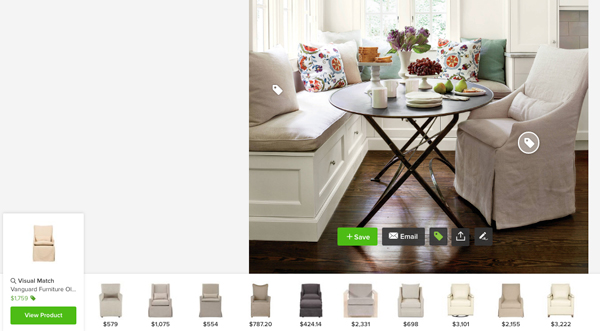Do You Need To Fear The Houzz Acquisition of Ivy?

On February 6, 2018, the home improvement website Houzz acquired the studio management software startup Ivy. This acquisition and merger has caused ripples and, at times, outrage in the design community. Here we attempt to bring the diverse voices together to examine concerns and the potential ramifications of this move.
We’ve learned from experience that with the right approach, Houzz can be a part of a successful marketing strategy for interior designers who want to increase their natural leads. However, Houzz is not without its share of criticism from the design community. In particular, many designers feel like Houzz doesn’t add value to the industry and is instead poaching its traffic and monetizing it by demanding advertising dollars from home pros. They also accuse it of making money off the sweat of design pros.
On the other side of the merger is Ivy – a project management software that allows collaboration between designer and client. Ivy promotes itself as a tool for project management including project proposals, time management, online vendor sourcing, and online payments. Ivy helps to relieve small design studios of tedious, time-consuming admin and tracking work. However, despite Ivy getting accolades for their user-interface’s aesthetics, it is nowhere close to as robust as its top competitors, especially Studio Designer.
![]()
With interior design and home improvement in common, it makes sense that one of today’s biggest power houses in the design industry (Houzz) would want to join forces with a highly popular and trendy company such as Ivy.
And, since Houzz has failed on delivering its own software solutions to home pros, as seen with their limited success in introducing a website builder called Site Designer, it makes good sense for them to buy into a pre-existing solution- even though it cost them nearly $15k per customer!
While Houzz has mastered its online presence with homeowners, it hasn’t quite perfected its relationship with the interior design and home improvement community. This is where Ivy steps in, as a tool design industry professionals, especially solopreneurs, have grown to know and love. With Houzz’s popularity with homeowners and Ivy’s strong relationship with professionals, the two could become an unstoppable pair that furthers its reach in the industry as a whole. But, it is more complicated than that.
For Houzz, the acquisition’s benefits are clear. They wanted to expand their user-base and revenue-base, and by acquiring Ivy, they will be engaging with design professionals now more than ever. From what we know at this moment, Houzz’s intentions are to expand the services offered to design studios and home improvement professionals as well as providing more internal client leads and efficient online payments.
Ivy benefits in a number of ways as well. As a business funded on just $2.9 million venture capitalist dollars, a $38 million dollar sale price, simply put, is a no-brainer.
So what does this mean for interior design and home improvement professionals?

Well, this is a hot debate right now, with some designers excited for Ivy and others upset with what this means for their business and clients (and privacy).
First and foremost, we can’t be sure how much Houzz will alter the Ivy experience. With the right mindset and a genuine desire to help streamline and modernize the interior design process for designers, Houzz has all the potential to create something innovative and advantageous for designers. However, Houzz does not have a history of putting designer’s concerns over their own bottom line.
Aside from further streamlining the process and expanding on the project management software, Houzz can use the Ivy platform to promote stronger relations with the design community. This could be in the format of an online forum for designers to communicate with one another, and generally, have more of a voice regarding design industry news, changes, innovations, and so forth.
As lovely as that sounds, Houzz stills has some serious skeptics. Designers fear that Houzz, not only will not benefit them, but will hurt them. From worrying about Houzz having access to a designer’s client contact list, accounting details, and product and design proposals, designers are being rightfully cautious in what will become of their Ivy software in the future.
Privacy is a very real need in one’s personal and professional life, and there are many designers terrified of Houzz having access to their proposals and project information. Questions posted online include how do we know that Houzz won’t be pulling client info from Ivy’s proposals and then retargeting them on behalf of Houzz Pro+ advertisers? It is hard to tell the line between plausible privacy concerns and outright conspiracy theories. However, in this day of big data, this is a debate worth having.
For those who think that privacy is a non-issue, here is a great Ted Talk on why privacy matters:
When it comes to accounting privacy, Joseph Hecker points out in this Facebook Live video that because Ivy doesn’t use their own accounting program, but, instead, an integration with QuickBooks, that client and designer information should, for the most part, stay encrypted and out of reach from Houzz. However, general contact and product details are probably free game.
If Joseph’s assessment is accurate, this should provide some solace for designers. Unfortunately, time will only tell for the next largest designer complaint: Houzz being able to see which products they are proposing to clients. This fear is legitimate, as Houzz has already incorporated a huge number of their marketplace products into designer’s portfolios via price tags which then leads users to similar looking furnishings or accessories that often is a fraction of the quality and price.

In other words, this concern is that a designer using Ivy invests time into developing a proposal for a client and that Houzz could abuse their access to this information by using targeted ads across the Internet- on Houzz, in Google display Adwords network, and via social media- to pitch low-quality alternatives of those carefully curated pieces.
If Houzz can see what interior designers are proposing to their clients, what is there to stop Houzz from reaching out to the clients themselves with an email with better price or free shipping? As an e-commerce site, this would definitely not be outside of the scope of consideration for Houzz to integrate into their practices.
And, with the move to remote contract workers, what would stop Houzz from eventually becoming the design studio and the store, essentially having the entire industry working for them?
Finally, what would prevent Houzz from turning the Ivy platform into something the consumer can use to manage their DIY projects and buy Houzz products seamlessly?
We will all be closely watching as the Houzz acquisition proceeds to unfold. In the meantime, it’s important to continue the conversation. Let us know how you feel about the merger as well as your fears and hopes for the future.
Additional readings on using Houzz to promote your design studio:
Houzz Profile Management and Optimization Services
Houzz Optimization vs Houzz Pro+ Advertising
Disclosures: We at Client Expander do digital marketing for interior designers and those that sell to them, including software as a service (SaaS) such as the mentioned industry leading design studio management cloud software, Studio Designer. We are Certified Houzz Marketing Consultants that independently work to promote our clients on Houzz via Houzz profile management and optimization. We are embedded in the design community and friends with all sides. And, we are staunch advocates of privacy, transparency, and integrity in business.




